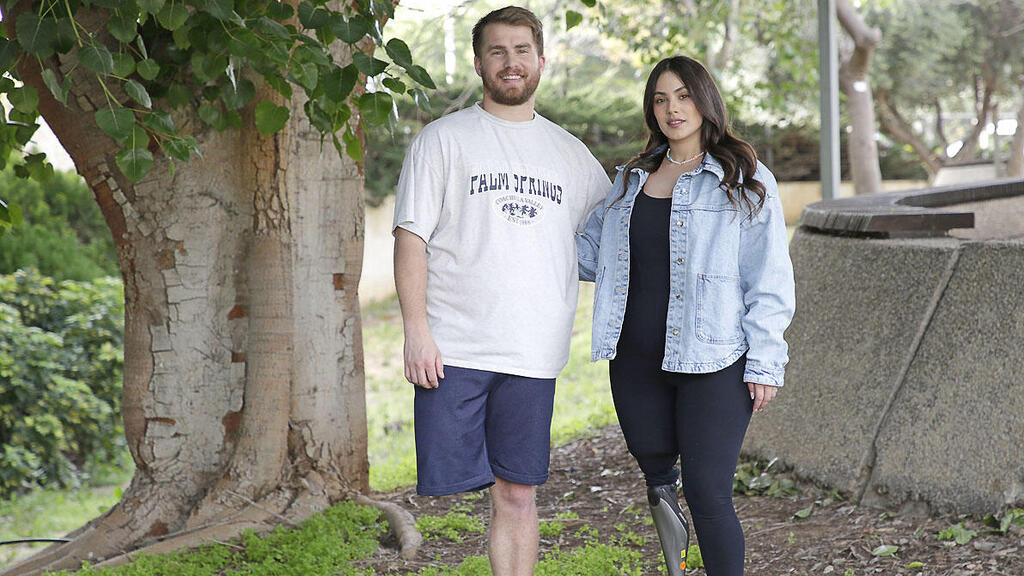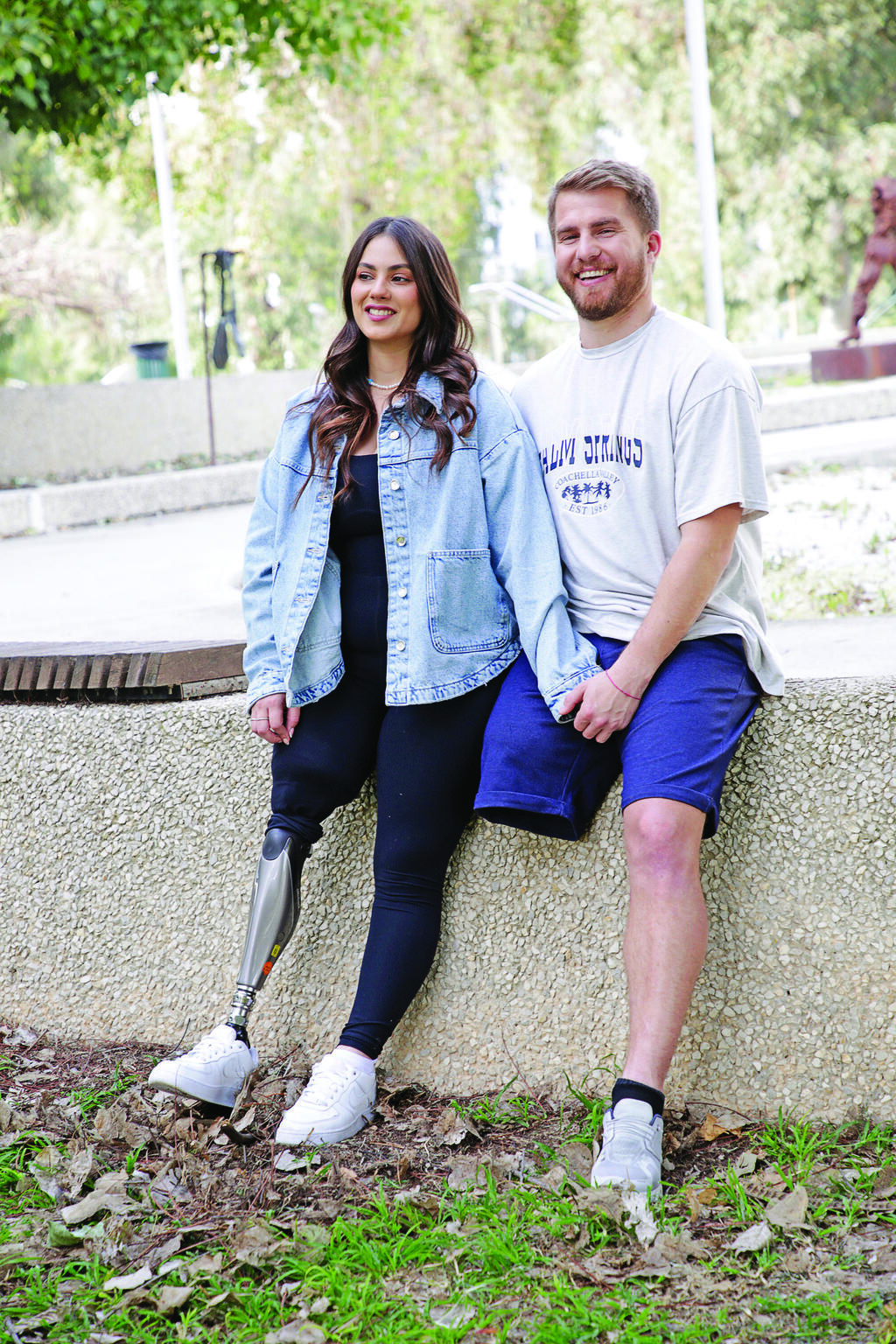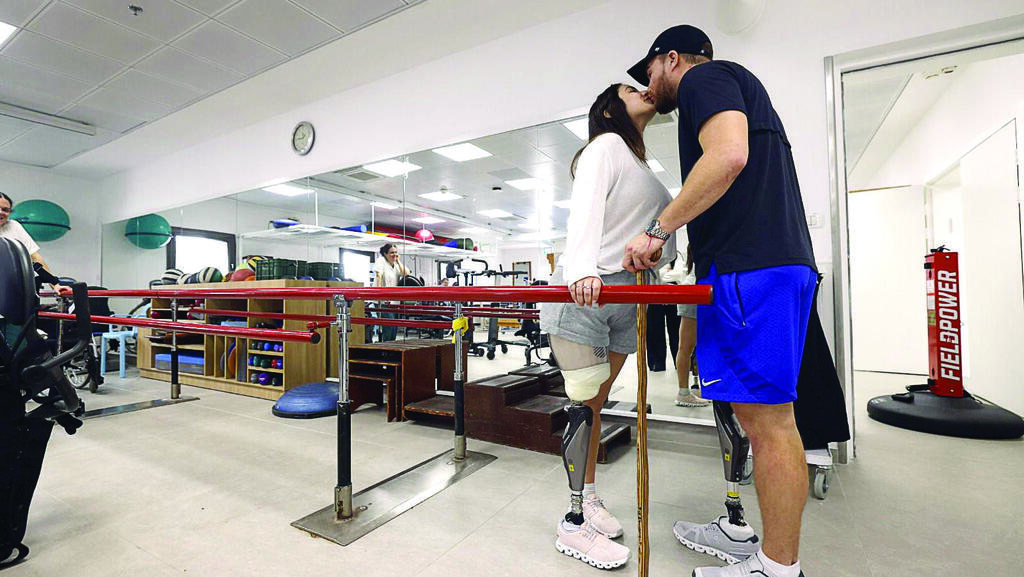Getting your Trinity Audio player ready...
During the interview at the Sheba Medical Center rehab ward, Gali Segal and Ben Benjamin were asked what might have happened if their injuries had been slightly different. They both acknowledged they hadn't thought about it before but found the question intriguing. They both replied emphatically, "What a relief that didn't happen!"
"If we were both destined to lose a limb, it's best that we both experienced the same thing," Gali shared. "We both have an amputation above the knee on our right legs. My injury was slightly more severe than Ben's because my stump is slightly shorter, leading to more frequent infections and discomfort. But ultimately, the rehabilitation process is the same, and we use the same prosthetic. I imagine it would have been different if the injury had affected a different body part. We would have been more focused on each other's advantages and disadvantages."
Ben chimed in, "There's a huge advantage in going through this together, experiencing the exact same process. It's immensely comforting for me on an emotional level. Having the woman I love most by my side all the time, I feel she understands me best. Just as I understand her pains, her struggles, and her frustrations. I can't say to her, 'You don't know what I'm really going through,' because she does know."
Gali added, "Because my injury was slightly more complex, Ben was a few steps ahead of me in the rehabilitation process. He started using crutches earlier and even got his prosthetic a month before me. Many times, he gave me tips on how to do things better. Before receiving a prosthetic, there's an evaluation you need to pass, testing your stability and strength. Ben briefed me on the exercises beforehand."
The proposal: a romantic trip to Italy
It's fair to assume you've heard about this young and lovely couple, who like many others, went to the Nova Music Festival to celebrate life, only to find themselves fighting for it after both were injured by a grenade that exploded in the van they were hiding in.
Today, in hindsight, their survival story stands out remarkably. Not only did they both lose their right leg above the knee, but they are also the only ones, among thousands injured in the blast, to have lost limbs and survived. Benjamin reflects, "I suppose during the chaos, many lost limbs but didn't make it out alive. So, Gali and I prefer to focus on the bright side. Not to ask 'why us?' but to look at those who didn't make it and understand how lucky we are. We both suffered humanly, but thankfully, we were rescued in time."
They've been together for seven years, introduced by mutual friends. Gali, 27, was born in Yikneam, and Benjamin, 29, in Kibbutz Ramat Menashe. Until October 7, they lived in a rented apartment in Ramat Gan. Gali completed her final year of studies in architecture and interior design at Shenkar. Benjamin, a football player until his injury in Kiryat Yam, also ran a real estate office with his good friend. Five months before the tragedy, during a romantic trip to Italy, he proposed to Gali: "The day after the party, we were supposed to book a venue and get married next September," they say.
They arrived at the party in Re'im with Benjamin's brother and his partner, along with their cousin. The five arranged to meet there with their mutual friend, Shani Gabbay, 26, who had just finished law studies and worked at the party as a selector. Benjamin's brother, his partner, and their cousin emerged unscathed. Shani was found dead, and the dreadful news came only a month and a half after the terror attack.
Since her body was not found, her family and friends assumed she was abducted. It was only later revealed that she had burned alive alongside other youths seeking refuge in an abandoned ambulance at the party site. The tragedy worsened as she was buried with another girl due to the difficulty in identifying her charred body. It was only through a necklace chain of Shani's, found at the site, from which they managed to extract DNA of the girl buried with her, that the horrifying mistake was uncovered.
"After the injury, Ben and I focused all our thoughts and hopes on Shani. We were sure she was abducted and would return safely. Instead of dwelling on our injury, we only thought about her. 'What happened to her? Where is she sleeping? What is she eating?' When we were told she was murdered on October 7, everything collapsed instantly. It was a terrible blow."
Benjamin adds, "The news that Shani burned, that her body connected to another body and was buried with her, is something you couldn't even imagine in a horror movie. I don't think I've fully grasped it yet. Every time I think about it, I break down in tears."
"In hindsight, the only comforting thought about going to the festival is that I got to hug Shani shortly before her death, that she was with me and Ben, among people who loved her so much," Gali reflects.
The rescue: both lost consciousness
In the first missile barrage, at half past six on that cursed Saturday morning, Gali, Benjamin, and Shani hurried to evacuate from the Nova compound and entered Gabbay's car. When they reached a deserted intersection, a policeman directing traffic ordered them out of the car and into the armored vehicle.
Gali recalls, "We were crammed into the armored vehicle with many other people. At first, it was just missiles, but then we started hearing gunfire. The three of us huddled together, convinced it was IDF fire."
Benjamin adds, "But then the terrorists threw grenades into the armored vehicle. Galia and I were injured and initially lost consciousness. Shani saw us both without legs, unmoving. In hindsight, according to her last phone call, we realized she was sure we were dead. Like everyone else in the armored vehicle who didn't die in the blast or lose consciousness, Shani rushed to escape. She got into a car, and on the way, the terrorists shot at her, hitting her leg three times. From the pictures we received, we understood she managed to return to the party compound, and even there they put a tourniquet on her leg, but in the end, as mentioned, she found her death there."
Gali recalls, "I remember during that time in the armored vehicle, after we were injured and woke up, I screamed to Ben, 'I have no leg.'"
"I also saw that my leg was torn from its place. I felt we were in a life-threatening situation, and all my thoughts focused only on the need to survive. I told Gali not to scream to conserve strength. I called my brother and cousin, and told them what happened, and they said, 'Take off your shirt and make a tourniquet.' We both were sure we were going to die. I told Gali, 'At least we'll die together,' and I gave her a kiss."
Two policemen who were securing the party redirected them into civilian cars along with other injured.
Benjamin explains, "They took Gali out first. When they took me out of the armored vehicle, I saw a woman's body lying outside, and I was sure it was Gali, that she was dead, which is why they left her outside. When they put me back in the car, I lost consciousness again and woke up only in the hospital, several hours after the evacuation."
Gali adds, "When they took me out, I screamed 'Bring Ben too,' but they put me in a car with another injured person. I was sure it was because Ben was dead. And yet, when I arrived at the hospital, I kept muttering all the time, 'Has anyone seen Benjamin?' And then, when they transferred me to another room with the bed, suddenly I saw him. I shouted 'Ben,' and he signaled to me with his hand. That was the moment I opened my eyes and calmed down. I told myself, 'He's alive, he's here.'"
After undergoing the first life-saving surgery, they were transferred for further treatment at Hadassah Medical Center. Benjamin underwent two more surgeries there. Galit's condition was more severe, and she had to undergo 13 surgeries. "The shrapnel penetrated also to the side, the chest area, the other leg, and the pelvis," she reports. "In the first month, I suffered from many infections in the stump, and twice a week, they had to open it to drain all the secretions."
A month later, in mid-November, they were transferred to the rehabilitation department at Sheba, where they spent more than four months. In fact, only recently have they been discharged from the rehabilitation department and moved to live in an accessible apartment in Kibbutz Ramat Menashe, near Benjamin's parents. "It's unbelievable that we were in the hospital for half a year," says Galit, "and we still continue to travel to the hospital twice a week for day rehabilitation."
How was the rehabilitation?
"Initially, we underwent a lot of physical therapy aimed at strengthening the body and preparing for prosthetics. After an amputation, you don't immediately get a prosthetic; you need to strengthen the muscles to bear weight and handle the pain. Later on, there were many exercises designed to teach us how to walk with the prosthetics," Gali explained.
Benjamin adds, "This was accompanied by occupational therapy treatments aimed at preparing us for daily functioning with the injury, even basic things like opening closets. There were also less conventional treatments like hydrotherapy, yoga, clay work, and even boxing! That was my initiative. I used to play soccer six times a week. I told the therapists I was bursting with energy. I asked if we could bring boxing gloves. Eventually, the hospital reached out to a boxing studio in Ramat Gan, which turned out to be our former neighbor, and we always met him in the dog park. It's a small world. Not only did he volunteer to bring boxing gloves, but he also brought a team of trainers, and the training became a routine treatment for many patients in the department."
But perhaps the most challenging aspect was the emotional coping. In the days following the injury, they plunged into what they describe as a deep depression. "I thought from that day forward we would both be confined to wheelchairs," says Gali, "I was sure I wouldn't even be able to give birth." Benjamin adds, "And I was convinced that's it, I'll never play soccer again. I vividly remember the first moment my dad saw me in the hospital. I removed the blanket, showed him my leg, and couldn't stop crying. Since I was a child, my dad used to drive me to games all over the country. For me, it wasn't just about losing a leg. It was about losing my essence. Who I am."
What about the wedding?
Benjamin: "We already have a new date set for the wedding; it will take place before September."
Gali: "Now, as we near the end of the rehabilitation process, we feel it's time for a celebration, to celebrate our great love and the gift of life we've been given. We realized that life is too short to postpone things, that if we want something, we do it here and now."
Benjamin: "And of course, we'll both walk down the aisle, and we even plan to dance."
Gali: "We've already started practicing the slow dance."






